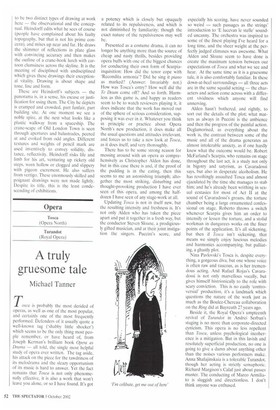A truly gruesome tale
Michael Tanner
Tosca is probably the most derided of operas, as well as one of the most popular, and certainly one of the most frequently performed. Defenders of it usually quote a well-known tag ('shabby little shocker') which seems to be the only thing most people remember, or have heard of, from Joseph Kerman's brilliant book Opera as Drama — all told, the single most helpful study of opera ever written. The tag aside, his attack on the piece for the tawdriness of its melodrama and the sleazy opportunism of its music is hard to answer. Yet the fact remains that Tosca is not only phenomenally effective, it is also a work that won't leave you alone, or so I have found. It's got
a potency which is closely but opaquely related to its repulsiveness, and which is not diminished by familiarity; though the exact nature of the repulsiveness may well be.
Presented as a costume drama, it can no longer be anything more than the source of cheap and nasty thrills, besides providing opera buffs with one of the biggest chances for conducting their own form of Scarpiainquisition: How did the tenor cope with 'Recondita armonia'? Did he sing it piano as marked? (Answer: Invariably not.) How was Tosca's entry? How well did the Te Deum come off? And so forth. Harmless as this game is, and happy as readers seem to be to watch reviewers playing it, it does indicate that the work has moved out of the sphere of serious consideration, supposing it was ever in it. Whatever you think in principle or practice about Opera North's new production, it does make all the usual questions and attitudes irrelevant, and forces us to take a new look at Tosca, as it does itself, and very thoroughly.
There has to be some strong reason for messing around with an opera as comprehensively as Christopher Alden has done, but in this case there is and, if the proof of the pudding is in the eating, then this seems to me an astonishing triumph; altogether the most striking, disturbing and thought-provoking production I have ever seen of this opera, and among the halfdozen I have seen of any stage-work at all.
Updating Tosca is not in itself new, but the resulting intensity and freshness is. It's not only Alden who has taken the piece apart and put it together in a fresh way, but the conductor Steven Sloane, a prodigiously gifted musician, and at their joint instigation the singers. Puccini's score, and especially his scoring, have never sounded so weird — such passages as the strings' introduction to 'E lucevan le stelle' sounded uncanny. The orchestra was inspired to some of the finest playing I've heard for a long time, and the sheer weight at the perfectly judged climaxes was awesome. What Alden and Sloane seem to have done is create the maximum tension between our expectations of Tosca and what we see and hear. At the same time as it is a gruesome tale, it is also comfortably familiar. In these down-at-heel surroundings — all three acts are in the same squalid setting — the characters and action come across with a different vividness which anyone will find unnerving.
Alden hasn't bothered, and rightly, to sort out the details of the plot; what matters as always in Puccini is the ambience and then the progress of the painful action. Deglamorised, as everything about the work is, the contrast between some of the music and all of the drama generates an almost intolerable anxiety, as if one hardly knew what the outcome would be. Robert McFarland's Scarpia, who remains on stage throughout the last act, is a study not only in bigotry and satyrism, as Cavaradossi says, but also in desperate alcoholism. He has revoltingly assaulted Tosca and almost ejaculated by the time she manages to stab him; and he's already been writhing in sexual ecstasies for most of Act II at the sound of Cavaradossi's groans, the torture chamber being a large ornamented confessional on stage. Roberto throws a switch whenever Scarpia gives him an order to intensify or lessen the torture, and a stolid workman in dungarees works on the finer points of the application. It's all sickening, but then if Tosca isn't sickening, that means we simply enjoy luscious melodies and harmonies accompanying, but palliating, a ghastly plot.
Nina Pavlovski's Tosca is, despite everything, a gorgeous diva, but one whose voice is often raw and raucous, as is her tremendous acting. And Rafael Rojas's Cavaradossi is not only marvellous vocally, but gives himself histrionically to the role with scary conviction. This is no easily 'controversial' production, it's a landmark which questions the nature of the work just as much as the Boulez-Chereau collaboration on the Ring did at Bayreuth 27 years ago.
Beside it, the Royal Opera's umpteenth revival of Turandot in Andrei Serban's staging is no more than corporate-directed cynicism. This opera is no less repellent than Tosca, unless psychological incoherence is a mitigation. But in this lavish and resolutely superficial production, no one is going to give a damn about anything other than the noises various performers make. Anna Shafajinskaia is a tolerable Turandot, though her acting is strictly semaphoric. Richard Margison's Calaf just about passes muster. The conducting of Marco Armiliato is sluggish and directionless. I don't think anyone was enthused.




































































 Previous page
Previous page